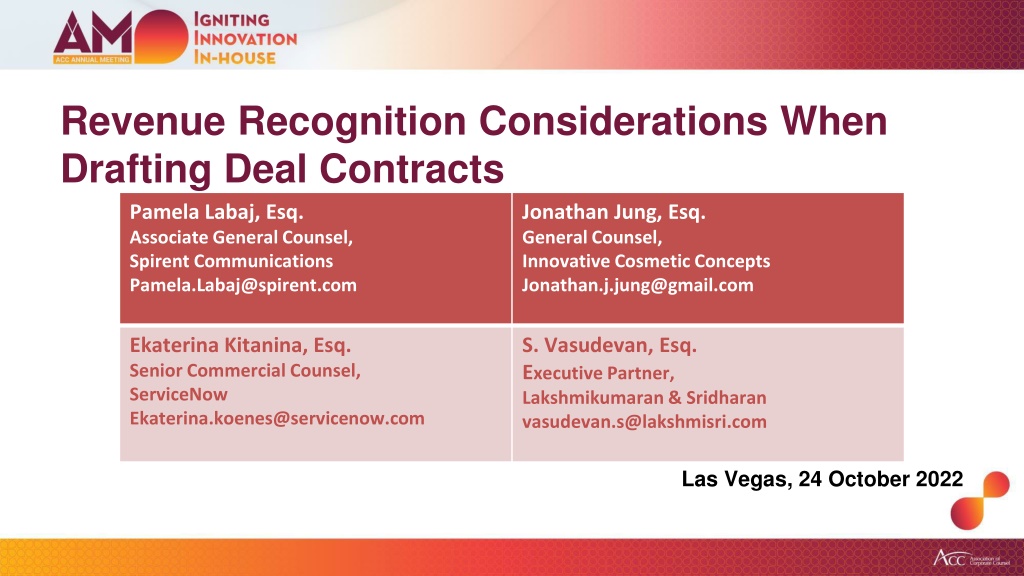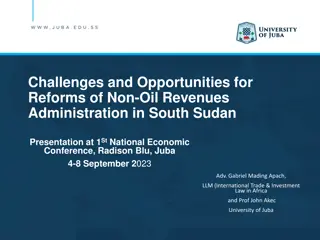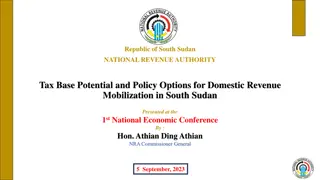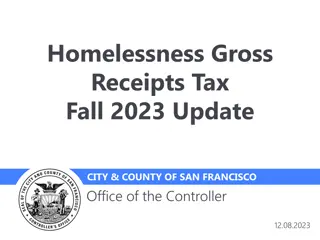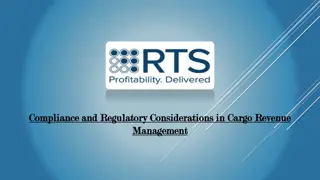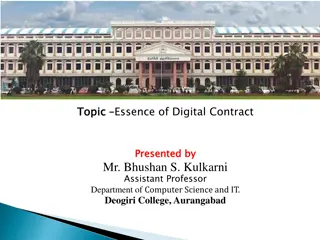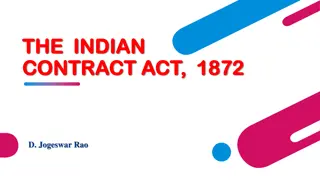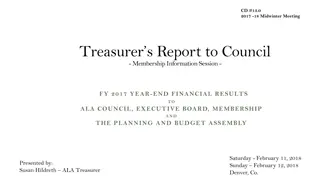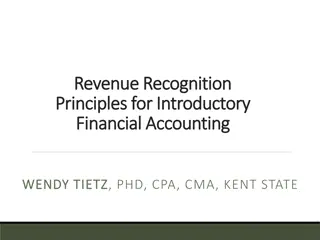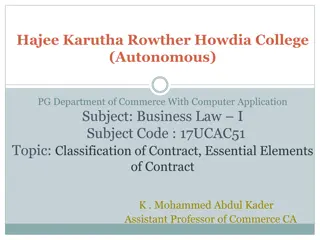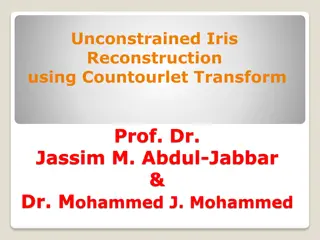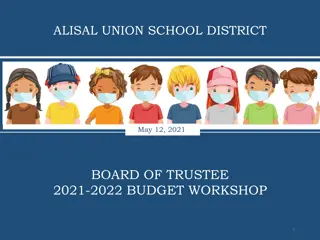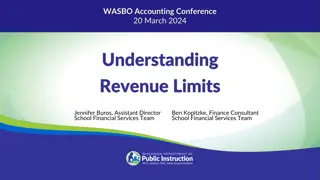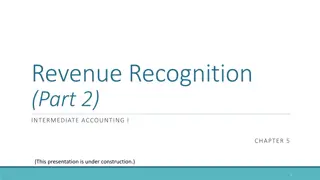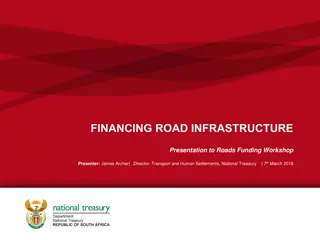Revenue Recognition Considerations in Deal Contracts
Exploring key aspects of revenue recognition in deal contracts under IFRS 15, including deferring revenue, product types, unacknowledged products/services, and milestone recognition considerations.
Download Presentation

Please find below an Image/Link to download the presentation.
The content on the website is provided AS IS for your information and personal use only. It may not be sold, licensed, or shared on other websites without obtaining consent from the author.If you encounter any issues during the download, it is possible that the publisher has removed the file from their server.
You are allowed to download the files provided on this website for personal or commercial use, subject to the condition that they are used lawfully. All files are the property of their respective owners.
The content on the website is provided AS IS for your information and personal use only. It may not be sold, licensed, or shared on other websites without obtaining consent from the author.
E N D
Presentation Transcript
Revenue Recognition Considerations When Drafting Deal Contracts Pamela Labaj, Esq. Associate General Counsel, Spirent Communications Pamela.Labaj@spirent.com Jonathan Jung, Esq. General Counsel, Innovative Cosmetic Concepts Jonathan.j.jung@gmail.com Ekaterina Kitanina, Esq. Senior Commercial Counsel, ServiceNow Ekaterina.koenes@servicenow.com S. Vasudevan, Esq. Executive Partner, Lakshmikumaran& Sridharan vasudevan.s@lakshmisri.com Las Vegas, 24 October 2022
Why do we defer revenue? Follow international accounting standards. IFRS15 (International Financial Reporting Standards), the most recent standard for revenue recognition which became effective for 2017. Summary principle of the revenue recognition standard: An entity will recognize revenue that reflects the consideration to which the entity expects to be entitled in exchange for transferring promised goods and services . audited by internal controls and external audit firms to ensure compliance with revenue recognition standards. Primary concern to be recognizing too much revenue up front that has not been earned. 2
Product Types and revenue implications: RECOGNIZE UPON TITLE TRANSFER OR SERVICES COMPLETION HARDWARE PERPETUAL SW (LICENSE) TRAINING INSTALLATIONS TEST/REPORT DEVELOPMENT REPAIRS/CALIBRATION RECOGNIZE OVER PERIOD OF TIME RENTALS SUBSCRIPTION SW SUPPORT CONTRACTS RESIDENT ENGINEERS CUSTOMIZED SOLUTIONS CUSTOMIZED SOLUTIONS HW & Perpetual SW recognized when customer has obtained control of the goods sold. Maintenance contracts recognized straight line over period of performance. Professional Services are recognized based on a measure of progress towards complete satisfaction of the performance milestones (milestone approach) OR based on the ordering documents and invoice (agile approach). 3
Products/Services that were not recognized . Why? General: Contingent agreements where parties agree to finalize the specific terms by the certain date after the signing date Acceptance Terms Goods: Shipped late in the month and title did not transfer to the customer in time Partial shipments Services: Not complete Termination for convenience/for cause if the cause is within party s control Subscription SW downsell rights 4
Milestones & Prof Services Milestone revenue such as Professional Services cannot be recognized until the services have been completed Confirmation of services performed must be provided Until we receive confirmation, we cannot recognize revenue Unknown/unclear performance obligations Unscoped Professional Services for X- Days Professional Services with no SOW 6 weeks of integration To be delivered over the next 3-5 months 5
Period of performance: Performance occurs when the seller has done most or all of what it is supposed to do to be entitled for the payment. Revenue could be Issues/Problems faced Support / Subscription Services Missing / Incorrect Start & End date Professional Services Need to confirm the date of completion Resident Engineer Services Incorrect Start & end dates Calibration/ Training/ Installation - Need to confirm the date of completion Things to consider FOB Terms, Acceptance Terms, Partial shipments & Date of Delivery 6
Services - Terms that affect revenue recognition - Non-standard use verification (checking that the number of users using the platform does not exceed the purchased number of users) Non standard service credits (SLC) Additional functionality security costs to be covered by the company providing services Non-standard terms providing additional benefits to customers - holds, price resets) - Customer right to change the type of services provided (might imply different revenue approaches, for example for Subscription SW - option to go self hosted) - Non standard payment terms (if the payment period is longer than standard (90/120 days), then it includes a financing component / discounts related to on-time payment) Pricing provisions (future pricing, if the pricing is different from other customers, price 7
Other types of terms affecting Rev Rec - Termination for convenience - what type is most favorable ? And what are the other types? E 1. Termination with penalty 2. Termination for a specific cause with the required proof 3. Termination for convenience without penalty without refund 4. Termination for convenience without penalty with refund - -how does warranty & indemnity affect Rev Rec ? - Vas - Types of warranty assurance and service warranty - Price allocation earned and unearned warranty revenue - Difference between warranty & indemnity impact on accounting
Incoterms & transfer of title: Risk passes to customer upon shipment: FOB ORIGIN FCA EXWORKS Risk passes to customer upon delivery: FOB DESTINATION DDP DAT FOB Origin (Domestic) Under FOB terms the seller bears all costs and risks up to the point the goods are loaded on the board vessel. From that point the buyer bears all costs and risks of loss or damage FOB Destination(Domestic) The sellerdelivers the goods onboard the ship and clears thegoods forexport. The sellerbears all costsandrisks of loss or damageuntil the goods reach theirfinal destination 9
Case studies Acceptance criteria Perfunctory Acceptance Acceptance does not have a specific period of days User Acceptance User will provide written acceptance after a specific period of days 10
Different Types of contracts with Rev Rec issues - Turn Key contracts - what is Rev Rec to keep in mind ? - - Composite supply of goods and services EPC contracts, hardware+software+services - Interlinkages between multiple supplies by same or different contractors - Milestone payments - Advances and retentions Intercompany transactions & rev rec issues - - Types of transactions IP licensing, Vendor Agreement, MSA, Shared Services, etc. - Vendor-Customer Relationship issues - What is the market T&Cs? - International tax concerns VAT, Transfer Pricing, etc. - - Subscription Software Agreements & Rev rec -- - Subscription Service - termination clause, customer s right to change contract terms during subscription term, non-standard terms - Professional Services for implementation when to recognize (time & material approach vs. packaged (standard implementation). T&M services for specific time period with defined scope after the specific time period, packaged after the implementation is achieved).
Specific contract consideration: - Service Credits/Discounts - what are their effects? - - A pre-specified financial remedy in the event of poor or nonperformance. - How and when are these credits being applied? Product delivery vs. Software - What s the rule of thumb when considering whether a services contract clause affect Rev Rec ? - If contract terms are not final (parties shall agree on specific provisions or a party can unilaterally affect/change the contract term) or a party receives additional benefits compared to standard terms
What are potential tax implications for Rev Rec ? - Taxation based on income earned during the assessment period/ year contract clauses have direct impact on revenue recognition and thereby on tax liability for the period Specific income recognition standards under tax laws which may be different from the applicable revenue recognition principles under accounting standards Time of supply triggers liability to pay VAT/GST, which in turn may be dependent on terms of contract relating to completion of supply/ service Timing of expenditure claim and tax withholding obligations of payer may also be based on contractual terms Transfer pricing implications of terms of contracts between group companies
